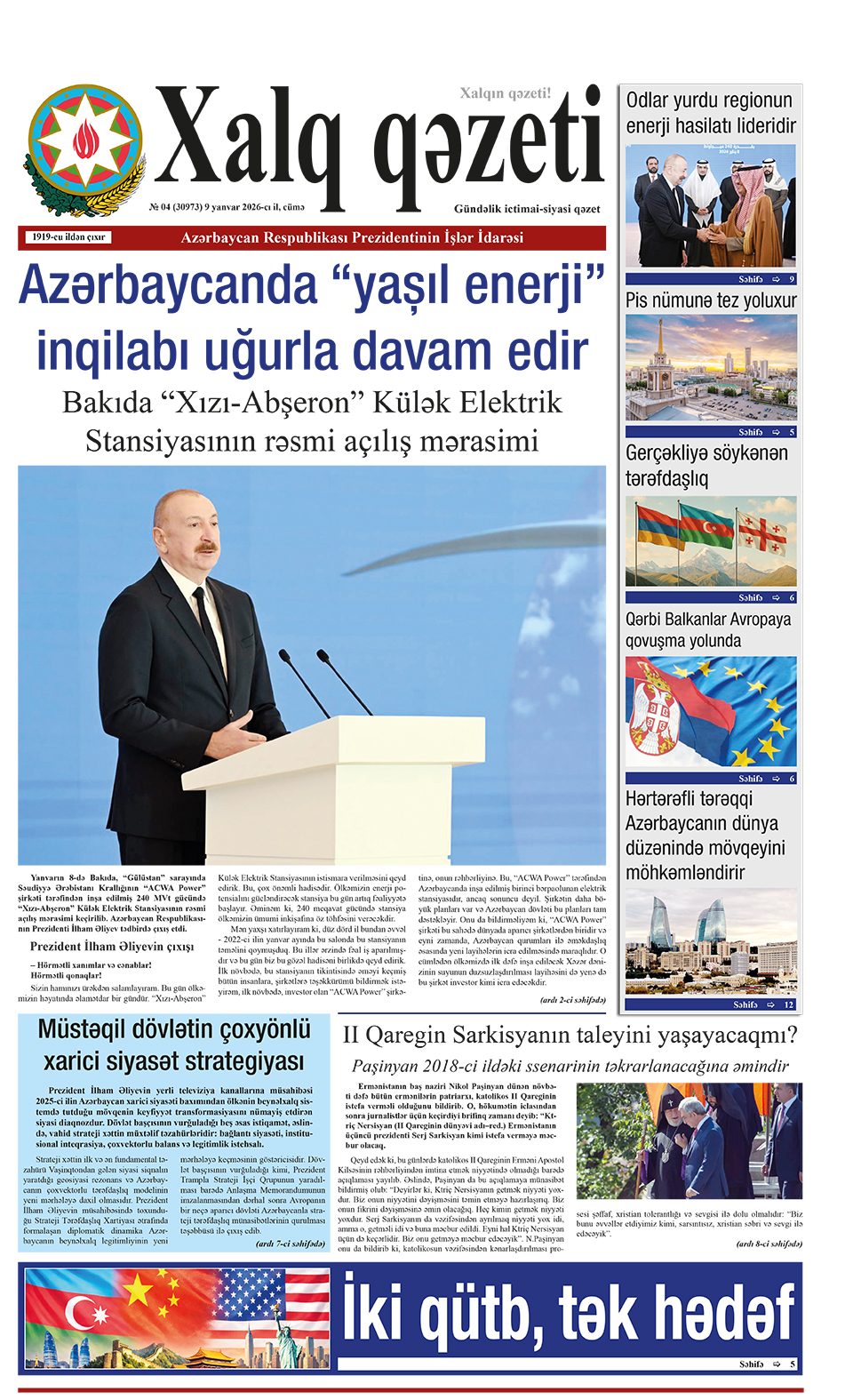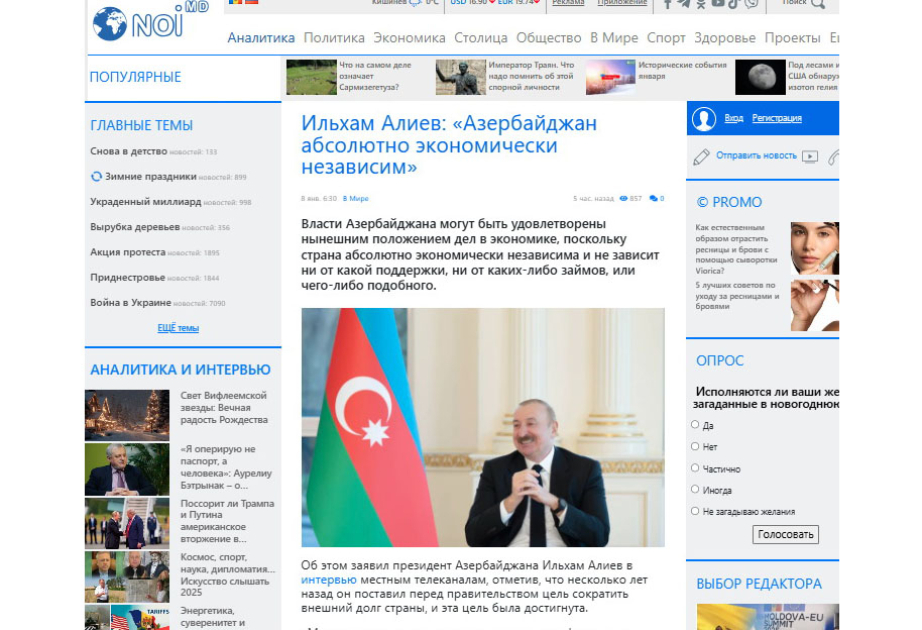Located on the upper reaches of the (Huang He) Yellow River, Lanzhou is the capital and largest city of Gansu Province in the northwest of China.
In ancient times, Lanzhou was known as "Yunyu", which means "Golden City" and by that time it was already one of the most beautiful cities in China.
The three-day trip, which included visits to exciting historical sites and landmarks, as well as acquaintance with various exhibitions, was enough for the Azerbaijani journalists to discover the importance of this city not only for China but for all mankind.
While watching various exhibitions and listening to guides' stories about the Chinese civilization, you can realize its greatness and significant role in world history.
Many exhibition halls, art galleries, and museums in the world fail to compete with the Chinese because all the exhibits in Chinese museums belong to the history of this ancient country.
The massive construction of highways, railways, a large number of tunnels, bridges, and small towns in Lanzhou is a testimony of the future development of this area of China.
The locals say that if you compare the Huang He River, flowing through the entire city of Lanzhou, with its “sources (roots)”, it is the "trunk" that nourishes all the branches of the "tree" of the ancient Silk Road called Lanzhou. Another unique feature of the city is its cultural mosaic enabling the coexistence of over 20 ethnic minorities.
Despite plenty of cafés and souvenir shops, the ideal cleanness is preserved in the area. The people are also very friendly as in every part of China.
Thanks to the fascinating nature of the areas along the Huang He River and the skill of Chinese builders, the bridge across the river is located in such a way that you can enjoy a spectacular view from both sides.
A large number of Chinese landmarks could be considered open-air museums, with their exponents enabling you to discover the country’s diverse history.
The Gansu Provincial Museum features an impressive collection comprising 350 exponents belonging to the ancient period of the Chinese Dynasties.
The Great Silk Road, a large part of which passes through China's northern Gansu Province, connected Eastern Asia with the Mediterranean Sea during ancient times. China exported silk, tea, paper, bronze products, and ceramics to the West. Thanks to the Silk Road and the exchange with different civilizations, the cities located on the caravan route gained a unique development, which has provided conditions for cultural exchange.
The museum also features a large number of historical samples, as well as samples of local flora and fauna. The museum’s most valuable exponent, which has become a symbol of the city, is the Flying Horse made of bronze belonging to the Han Dynasty, discovered near the city of Uwei.
All areas, especially the tourism sector, is rapidly developing in Gansu province. As in all of China, it welcomes guests from all over the world with its must-see landmarks attracting tourists from all over the world.
The tour program to Gansu Province included a visit to Lanzhou Chemical Industrial Park, Lanzhou Planning Exhibition Hall, "Duzhe" Publishing and Media Co Ltd, "Guangzhou Daily Newspaper Group," museums and attractions of this northern region. We also had the opportunity to attend a concert at the Lanzhou University of Arts and Science, visit the Dunhuang Painting and Art Gallery, and attend a reception hosted by the Gansu Provincial Foreign Affairs Offices.
An interesting meeting took place at the "Duzhe Publishing Group Ltd", established in 2006 on the basis of Gansu People's Publishing House, founded in 1951. The company has nine publishing units and a textbook publishing center.
Gansu Daily, founded on September 1, 1949, is the official newspaper of the Gansu Provincial Committee of the Communist Party of China. The editorial office has many departments and divisions in 14 cities of the republic. State-owned "Gansu Daily Newspaper Group" owns 7 newspapers, 2 news programs, 5 websites, and manages 48 new media accounts.
"Duzhe Media" holding publishes 13 magazines, including "Duzhe" and "UFO Research" publications. Its flagship product, Duzhe Media Magazine, was first published in 1981, and has been considered a leading magazine in China for many years, earning a reputation as the "spiritual guide of the Chinese people".
According to the World Brand Lab, the brand "Duzhe" has been included in the list of the 500 most valuable Chinese brands for the past 20 years.
The visit to the Lanzhou University of Arts and Science and the concert by the students of this educational institution became one of memorable events. The entire performance took place against the background of digital scenery depicting the nature and history of China.
Our program also included a visit to the art gallery in Dunhuang. The gallery represented a digital exhibition of the Cave Temples of Dunhuang. Mogao Caves in the city of Dunhuang in the west of China are a treasure trove of ancient Chinese civilization. This historical monument is more than 1700 years old. There are 735 caves, which include 45 thousand square meters of murals and more than two thousand painted sculptures. "Mogao Grottoes" is included in the UNESCO World Heritage List as one of the largest historical sites in China.
UNESCO awarded Dunhuang Academy for the preservation of the ancient Mogao cave complex. Chinese specialists widely use digital technologies to preserve this historical sites.
Azerbaijan-China relations: Ancient history and great prospects
The relations between Azerbaijan and China have been developing successfully in recent years. Thanks to the personal participation and assistance of the heads of state of Azerbaijan and China, the political mutual trust is deepening, the two countries maintain fruitful cooperation in various areas and support each other on international platforms. Azerbaijan is a partner and active participant in the Belt and Road initiative. Chinese enterprises take part in the restoration of the liberated territories of Azerbaijan. A number of companies have already started directly implementing various projects in these areas.
During the meeting held with Ma Yuping, First Deputy Director of the Publicity Department of Gansu Province of the Communist Party of China (CPC), the discussions mainly revolved around the issues on importance of relations between Baku and Beijing, as well as China's interest in developing ties with Azerbaijan. The sides also exchanged views on the necessity of cooperation between the two countries’ media outlets, as well as other issues.
I would like to express my deep gratitude to everyone who contributed to the excellent organization of our visit to Gansu Province, in particular to Li Renying, Deputy Secretary-General of the Belt and Road Alliance for Science and Technology, Director of the Belt and Road Research Center of the Azerbaijan State University of Economics.
In 2011, at the initiative of Li Renying, the Confucius Institute was established at the Baku State University. He also contributed to the establishment of inter-university relations between various universities of China with Baku State University, Azerbaijan State Oil and Industry University and Azerbaijan State University of Economics, and more than 50 Chinese students were sent to study abroad at different universities in Azerbaijan.
For centuries, Gansu was the vital corridor between China and Central Asia with almost 1600-kilometre section of the Silk Road passing through it. The province is also home to a significant part of the Great Wall of China, whose ruins can impress you with their sizes.
The region has repeatedly changed its names: Ganzhou (Cao Wei – 220-265, Tang dynasty – 618-907), Suzhou (the old name of the modern city of Jiuquan). In antiquity, the area was also named Lunsi or Luniu marking the region’s geographical position in the western part of the Lunshan mountains.
Standing on the Silk Road made the territory multinational, as a result of which various religions have settled there: Buddhism, Islam, Christianity, Confucianism, and Taoism.
The visit of Azerbaijani journalists to China was organized at the initiative of the Embassy of China in Azerbaijan.


.jpeg)













